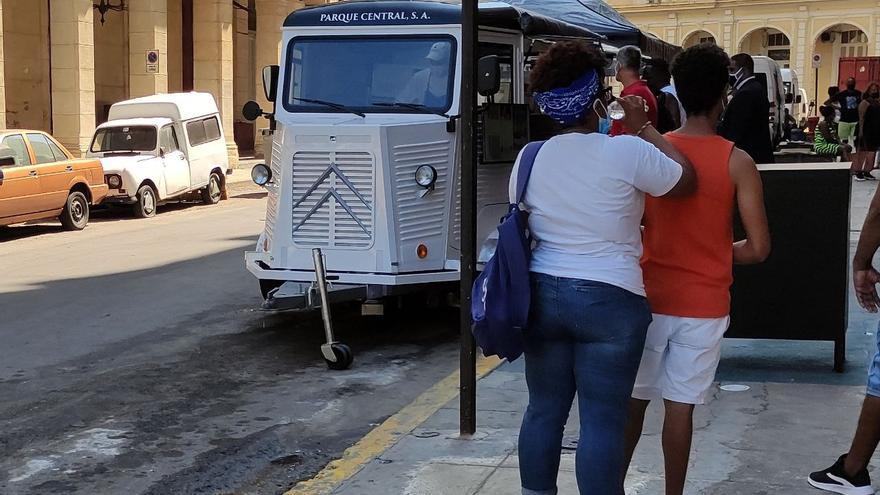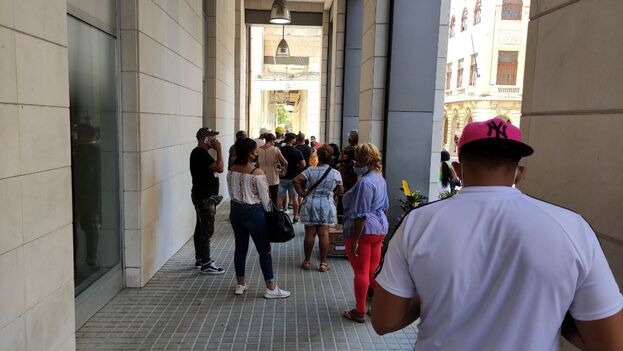
![]() 14ymedio, Juan Diego Rodríguez, Havana, 25 March 2021 — The street used to be full of tourists but now, on the stretch from the corner of Virtudes to Paseo del Prado in Havana, there is only one truck and a line to buy croquettes, sandwiches and soft drinks. Protected by the shadow of the imposing Iberostar hotel, dozens of people wait to take home cooked or semi-finished food.
14ymedio, Juan Diego Rodríguez, Havana, 25 March 2021 — The street used to be full of tourists but now, on the stretch from the corner of Virtudes to Paseo del Prado in Havana, there is only one truck and a line to buy croquettes, sandwiches and soft drinks. Protected by the shadow of the imposing Iberostar hotel, dozens of people wait to take home cooked or semi-finished food.
The line has started to form very early this Thursday. Before opening the sides of the peculiar food truck (Cubans use the English name) the employee writes a “no” on the board next to some menu items that have already been sold out and reminds customers that “this is not a bodega (ration store) this is a hotel.” The truck gleams in the March sun and murmuring is heard in the line.
The opening has been delayed for almost half an hour, after ten in the morning when it should have started selling, and the employee apologizes as customers complain about the slowness, but “there are few hands and we already had to put the ice cream at another point of sale because it was what attracted the most people.” In a city marked by food shortages, not even the prices — hardly cheap — of the food truck make them give up going to the place.
The sun is biting and the white surface of the truck glows. “We read on the internet that they had opened the truck and that there was ice cream. We got in line at six in the morning but in the end the tubs of ice cream are no longer being sold here but around the corner, in a place that they set up for that ,” says a woman, as the employee points to the corner.
The vehicle, produced by the Spanish company GEM Soluciones Industriales, mimics the old Citroën H1, a light commercial vehicle produced by the French manufacturer between 1947 and 1981, and which was used in the sale of food on the streets of cities such as London and Berlin. The European company clarifies that, initially, the Iberostar truck was intended as a tourist attraction.
The plummet of foreign visitors due to the pandemic, together with the shortage of food that the island is experiencing, has converted the ‘entertaining’ food truck into a busy food outlet. Unlike its great-uncle, the Citroën H1, the truck does not move from the place and does not even have a cab for the driver, but functions as a trailer that must be pulled by another vehicle.

“I came to look for the precooked croquettes that they are selling. My choices are this line or waiting for hours in front of a store to see if they put something on the shelves. At least this is safer although it is not cheap. There is nothing cheap now in Havana,” comments a young man who has been sitting on the lid of a water tank since before the sun rose.
The food prices range from the 35 peso ham sandwich, the lowest figure on the blackboard, to a combination of three hamburgers with buns and soda that exceed 550 pesos and other more complex combos that cost a third of the monthly minimum wage. There are no sweets left, no cheesy ham bites and drinks are only served with food.
“I came to order three roasted chickens for a birthday that I have tomorrow, but the chicks are, in truth, quite small,” laments a lady who arrives and sees the small size of the chickens. “Something is better than nothing,” another customer replies. “If you are going to buy those frozen chickens, you can’t find them and the store where they are sold only sells one per person.” The price of the combination that the woman is looking at is 750 pesos.
“The prices are not expensive if you compare them with what some home paladares (private restaurants) are selling, but of course, without home delivery this is not available to anyone either. They are prices that can be paid once but forget about becoming a regular of this truck,” adds a young woman who has carried a bag full of croquettes to take away.
At the beginning of the pandemic, when tourism began to decline and many hotels closed their doors, Iberostar Parque Central set up a home delivery service for food. There were ready meals and also combinations with different types of cheeses and cold cuts. “The phone lines were burning up, the people called desperately”, remembers an employee.
Given the abundance of orders, the administration of the place changed the service to ordering only 24 hours in advance and changed the menu a bit. “Now what we sell mostly are ready-made dishes and these variants of pre-cooked croquettes, mainly,” explains the worker.
As he speaks, two young men come around a corner of Calle Virtudes. Each one carries a box with ice cream that they have bought in the neighboring store that now delivers the product to avoid greater crowds in front of the truck. One of them also bears a box and, on the lid, is the logo of the hotel chain. Nine letters that until recently meant only a prohibitive luxury for anyone who now lines up there.
____________
COLLABORATE WITH OUR WORK: The 14ymedio team is committed to practicing serious journalism that reflects Cuba’s reality in all its depth. Thank you for joining us on this long journey. We invite you to continue supporting us by becoming a member of 14ymedio now. Together we can continue transforming journalism in Cuba.
